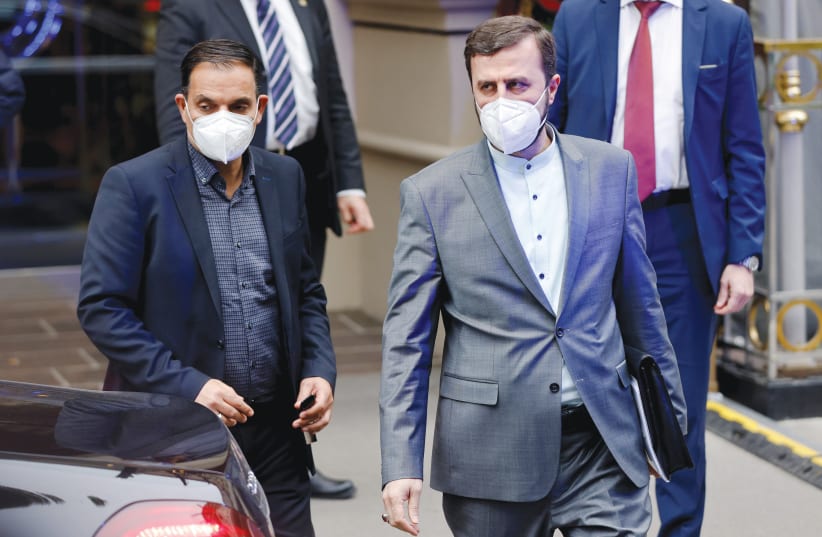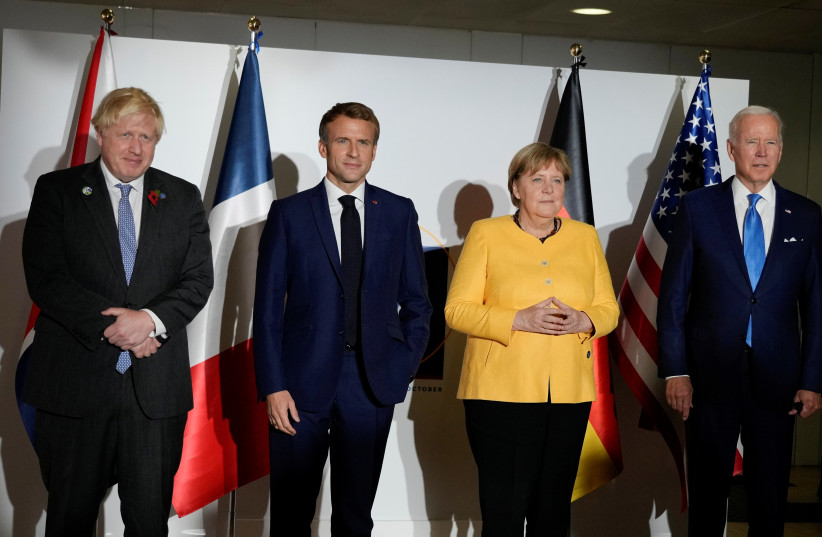Nuclear talks with Iran are moving too slowly for an agreement, French Foreign Minister Jean-Yves Le Drian said on Friday, as a source in Vienna said there were unresolved issues in every part of the negotiations.
“This negotiation advances way too slowly to be able to reach a conclusion and there will be nothing more to negotiate if it continues like this,” Le Drian stated, while saying the success of the talks is “vital.”
“We now have to conclude and come to a decision: Either the Iranians want to complete this, in which case we have the impression that there will be flexibility in the Americans’ stance,” Le Drian said, “or they don’t want to complete this, and in that case, we will be faced with a major proliferation crisis.”
A source close to the talks said that many issues in a range of areas remain unresolved in indirect talks between Iran and the United States on reviving the 2015 Iran nuclear deal.
“In every single part of the [unfinished] paper [outlining a deal] there are issues that are still under consideration,” the source told reporters on Friday, adding that while negotiations are moving in the right direction, they “do not have all the time in the world.”
The delegations of Iran and the E3 – the UK, France and Germany – returned to their capitals for consultations over the weekend.
Le Drian spoke alongside European Union foreign policy chief Josep Borrell, who said, “I think we need to speed things up. As the minister said, if Iran becomes a nuclear power, then we will not have achieved anything. We need to bring the US back into the agreement and the Iranians also have to comply.”
Similarly, US Secretary of State Antony Blinken said on Thursday that “We’re very, very short on time” and there were only “a few weeks left to see if we can get back to mutual compliance” with the 2015 nuclear deal.
“Iran is getting closer and closer to the point where they could produce on very, very short order enough fissile material for a nuclear weapon,” Blinken warned on NPR. “And at the same time, they’re making advances that will become increasingly hard to reverse because they’re learning things; they’re doing new things as a result of having broken out of their constraints under the agreement.”
ASKED IF Washington is prepared to ramp up pressure on Tehran if the talks fail in a few weeks, the secretary of state said the US was working with its allies on its options.
“Everything in its time, but this has been the subject of intense work as well in the past weeks and months,” Blinken said. “We’re prepared for either course, but it’s clear that it would be far preferable for our security and for the security of allies and partners if we can get a return to compliance. But if we can’t, we will – we’ll deal with this in other ways.”
The Joint Comprehensive Plan of Action, as the 2015 Iran nuclear deal is known, restricted Iran’s uranium enrichment in exchange for the gradual lifting of sanctions. The restrictions expire at the end of 2030.
The US left the agreement in 2018, and Iran has enriched uranium far beyond the JCPOA’s limitations, to 60% – weapons-grade is 90% – and violated the agreement by developing uranium metal.
The Biden administration seeks to restore the JCPOA and has been negotiating in Vienna indirectly with the Islamic Republic – which refuses to have its delegation be in the same room as the Americans – on-and-off since April of 2021. The talks are currently in their eighth round, which began in late December.
Though Borrell agreed with Le Drian that the talks are moving too slowly, he remained optimistic that the JCPOA could be restored.
“We’re arriving at the end of a long process,” Borrell said on Friday, following a meeting with EU foreign ministers. “There’s a better atmosphere since Christmas. Before Christmas I was very pessimistic; Today I believe reaching an accord is possible.
“I still maintain the hope that it would be possible to remake this agreement and have it function as it did before the American withdrawal,” Borrell said, positing that a deal could be reached “in the coming weeks.”
Russian Foreign Minister Sergei Lavrov also said in a press conference on Friday that he was hopeful an agreement can be reached, citing “real progress” in Vienna.
“There’s real desire – primarily between Iran and the United States – to understand specific concerns and how these concerns can be considered in the general package” of the agreement, he said.
MEANWHILE, the Chinese and Iranian foreign ministers announced the launch of a 25-year cooperation agreement aimed at strengthening economic and political ties.
A summary of the meeting between ministers Wang Yi and Hossein Amirabdollahian was posted on China’s Foreign Ministry website on Saturday.Wang, who is also state councilor, said the US bore primary responsibility for the ongoing difficulties with Iran, having unilaterally withdrawn from a 2015 nuclear deal between Tehran and the major powers.
China would firmly support a resumption of negotiations on a nuclear pact, Wang said, but China firmly opposes unilateral sanctions against Iran, political manipulation through topics including human rights and interference in the internal affairs of Iran and other regional countries.
China and Iran, both subject to US sanctions, signed the 25-year cooperation agreement last March, bringing Iran into China’ Belt and Road Initiative, a multi-trillion-dollar infrastructure scheme intended to stretch from East Asia to Europe.The project aims to significantly expand China’s economic and political influence, and has raised concerns in the United States and elsewhere.
The Foreign Ministry summary said the agreement would deepen Sino-Iranian cooperation in areas including energy, infrastructure, agriculture, healthcare and culture, as well as cybersecurity and cooperation with other countries.
Wang, who earlier in the week met with several counterparts from Gulf Arab countries concerned about the potential threat from Iran, also said China hopes to set up a dialogue mechanism with Gulf countries to discuss regional security issues.

